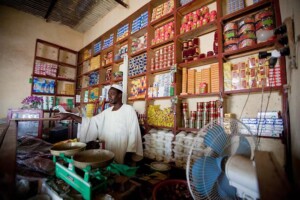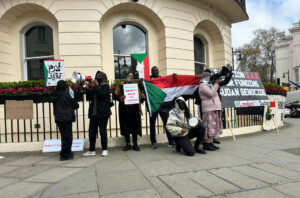Sudan’s anti-corruption committee uncovers banking fraud and plans reveal new resolutions
The Sudanese anti-corruption committee, Committee for Dismantling the June 30 System and Recovering Stolen Funds, announced that it will revise 200 draft resolutions that will be revealed soon. The committee also revealed the existence of fraud and money laundering operations in 90 bank accounts.
 The dismantling committee's official emblem
The dismantling committee's official emblem
The Empowerment Elimination, Anti-Corruption, and Funds Recovery Committee announced that it will revise 200 draft resolutions that will be revealed soon. The committee also revealed the existence of fraud and money laundering operations in 90 bank accounts.
At the committee’s press conference in their office in Khartoum on Sunday evening, member of the Anti-Corruption Committee* Wajdi Saleh said that the draft resolutions will concern all sectors in the economic and the civil services.
He explained that the presence of elements of the former regime in the civil service has hindered the state in bringing about real democratic transition and lead to the wasting of money and time of Sudanese people.
Saleh promised that a careful study of the civil service file will be presented in the coming days.
The committee also revealed the existence of fraud in 90 bank accounts. Saleh explained that large numbers of withdrawals and deposits took place every day of transactions that have nothing to do with investment or import and export operations, suggesting money laundering or unjust speculation.
Saleh said that the committee’s investigation into some accounts suspected of money laundering operations, which are internationally recognised, contributed to maintaining the stability of currency rates in the country.

Criticism
He explained the committee has often been accused of hindering finance flows and economic development in the country through its great powers, but stressed that the committee is a state institution created by the revolution.
He refuted allegations that many people were arrested by the committee, saying that “the era of detention has ended” but that some were arrested in criminal proceedings in accordance with the Code of Criminal Procedure and that these procedures are carried out by the concerned judicial institutions.
The committee itself does not arrest nor detain people, Saleh explained: “No state institution can arrest any Sudanese citizen, especially not after the revolution”.
Regarding the bank accounts, he said that the committee does not reveal any account details unless there is serious suspicion and will always do so in accordance with international law and legal procedures.
* The Empowerment Elimination, Anti-Corruption, and Funds Recovery Committee was formed in November 2019 after the transitional government approved a law to dismantle the institutions set-up by the regime of Omar Al Bashir and his National Congress Party (NCP). Since then, the Committee has been instrumental in breaking the party’s grip on the political scene and state resources. However, many officials linked with the former regime are still deployed on state and locality levels. Empowerment (tamkin) is the term with which the ousted government of Omar Al Bashir supported its affiliates in state affairs by granting them far-going privileges, including government functions and the setting-up of various companies.











 and then
and then